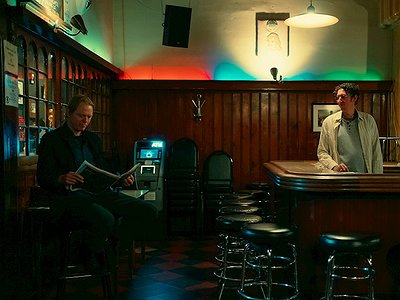Name: Mute Duo
Members: Skyler Rowe(drums, percussion, vibraphone, piano), Sam Wagster (pedal steel, organ, drum machine/programming )
Nationality: American
Current release: Mute Duo's Migrant Flocks is out April 14th via American Dreams.
If you enjoyed this Mute Duo interview, and would like to know more about the band, visit them on Instagram.
Where does the impulse to create something come from for you? What role do often-quoted sources of inspiration like dreams, other forms of art, personal relationships, politics etc play?
The impulse to create something comes from the love of, or yearning for creating and from an enthusiasm for music. It just feels like a natural, intuitive inclination towards that kind way of communicating.
For both of us, it feels more natural than any other medium we’ve dabbled with individually.
For you to get started, do there need to be concrete ideas – or what some have called a 'visualisation' of the finished work? What does the balance between planning and chance look like for you?
For us, everything starts with impulse and exploration without a finished goal or structure. We tend to start with improvisation and then gradually hone certain things that arise.
Often we will play a new idea live very early on and that will help determine its direction. Sometimes things will start with a simple idea or motif. But the songs always change a bit, even after we’ve recorded them.
Do you have certain rituals to get you into the right mindset for creating? What role do certain foods or stimulants like coffee, lighting, scents, exercise or reading poetry play?
We listen to music and artists that inspire us and let that energy seep into whatever we are doing - whether it’s a show, a writing session, or recording - even if it is a very different kind of music than what we are producing.
What do you start with? How difficult is that first line of text, the first note?
We try to start with silence and patience.
The first element isn’t difficult, we just start with whatever grabs our interest, whether it is a beat, a motif, or a sound.
Many writers have claimed that as soon as they enter into the process, certain aspects of the narrative are out of their hands. Do you like to keep strict control over the process or is there a sense of following things where they lead you?
We definitely follow where things lead and let any structure emerge gradually. Once we have something we are into, it is usually easy to follow through to a conclusion.
We just try to keep it communicative instead of trying to control the outcome.
There are many descriptions of the creative state. How would you describe it for you personally? Is there an element of spirituality to what you do?
Our music comes from an openness where the trust between us as players creates a kind of free-state, primarily for us, and hopefully for the people we collaborate with or play for.
Especially in the digital age, the writing and production process tends towards the infinite. What marks the end of the process? How do you finish a work?
Live, we let the beginnings and ends of things determine themselves. But, with Migrant Flocks we did make an effort to meet the running time of an LP without needing to do any editing.
On Lapse in Passage we tracked things more loosely and then edited it down to a single LP.
Once a piece is finished, how important is it for you to let it lie and evaluate it later on? How much improvement and refinement do you personally allow until you're satisfied with a piece? What does this process look like in practise?
In the studio, we typically know very quickly when the recording of a song is done. But, the song tends to keep changing when we play it live.
We recently played and re-worked songs from the first and second records and approached them the way we play now as opposed to how we played when we recorded them.
What's your take on the role and importance of production, including mixing and mastering for you personally? How involved do you get in this?
We are pretty hands on with production and mixing and have been lucky to work with people who are collaborative during tracking and mixing. We do a fair amount of experimenting in the studio, as opposed to just running down the songs.
With mastering, we have found a great partnership with Mikey Young who works remotely from Australia.
After finishing a piece or album and releasing something into the world, there can be a sense of emptiness. Can you relate to this – and how do you return to the state of creativity after experiencing it?
After finishing a record, we are usually excited about the next thing, or wave of activity, or whatever we are working on currently.
There was definitely a feeling of emptiness during lockdown, when we couldn’t play live, rehearse, or support our record that came out that year. Thankfully we’ve been able to play consistently since then.
Creativity can reach many different corners of our lives. Do you personally feel as though writing a piece of music is inherently different from something like making a great cup of coffee? What do you express through music that you couldn't or wouldn't in more 'mundane' tasks?
Free, creative ideas and natural chemistry. Collaborating freely for its own sake. Choosing to make music with a good friend.




